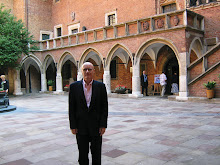More Suffering on Its Way
Many of you are enjoying the sunny days of June, planning a picnic, going for a swim perhaps in a favorite lake; others might be contemplating a lunch outside, or maybe even attending to the weeds circling your tomatoes. Others will be standing in line for job fairs. Some will be sorting through the remains of their home, if they can even find what once was their home. Others are still floating in rivers and bays, not yet quite buoyant to pop up and be spotted, or nibbled on by finny creatures. Sooner or later, we’re all in tears, wondering why this has happened to us.
In the new issue of The New Yorker, (June 9-16, 2008) James Wood wonders about it as well, or we could say, on your behalf, as he reviews a number of new books which update the constantly befuddling conundrum of suffering. If you have made it this far in the blog, I would urge you to read the article, “Holiday in Hellmouth,” either in the print edition, or in the on-line edition before reading any further.
Now that you have at least glanced at the essay, I do wonder if good people would ever stop lamenting our sorry situations when we are down and out, groveling in our religious pity over terribly troubling life experiences that take us to the very depths of who we are as creatures of this earth. As you know by now, the book review/reflective essay is beautifully written to invoke our own miserable lives when something breaks down and reminds us of something more powerful has caused this to happen, or at least we might want to think so.
Suffering is something we can all relate to, right, for who doesn’t have a little empathy or pity for someone or some country or even a few whales who have gotten themselves onto a beached predicament. We all have feelings, right? Some of us express them better than others, right? Some respond impulsively with a check to alleviate the pain. Others talk about it at the water cooler, if there even is a water cooler anymore. Others just shake their head, somewhat relieved what has happened has not yet happened to themselves, a reminder that we are all close to what Job has already experienced eons ago.
But for all the Jewish and Christian references Mr. Wood reminds us of as he reviews several new books on our oldest theme, I do wonder why he has not balanced the essay with any Eastern traditions such as Buddhism which has something quite powerful to say about suffering. Heaven, or the idea of Heaven, writes Mr. Wood, is the concept that seems to “right” all the wrongs that have blemished this earthly life. And linked to Heaven, of course, is the Messiah, or the Awaited Messiah. In other words, it’s been bad, but in the next life, all our troubles will somehow vanish, that is, unless we’ve been tried and sentenced in the Heavenly Court for crimes that created someone else’s suffering.
But the Buddhists do have something that balances all of this, which Mr. Wood has strangely left out of his absorbing essay. Life is suffering, the Buddha would say. But when bad things do happen to Buddhists, no one cries out why did a Greater Force cause or allow this to happen? Life simply includes moments, perhaps even years, where things do go badly, but we can alleviate this suffering by becoming a little less absorbed in or own ego, and assisting others who are in pain and who are suffering. But there’s no Messiah, or God, or Heaven as a reward for this action, for there is simply the loving act of assisting others that lessens the burden of suffering. For both Buddhists and Hindus, the cycle of samsara, of life, death, and rebirth, in some way provides an answer to this suffering.
As much as I enjoy the films starring Sharon Stone, I do wonder why she so naively blamed the earthquake in China on China’s “Tibetan” problem. She blamed this tectonic motion in the Sichuan Province on bad karma. A few days later she apologized when she realized her foolishness about Chinese karma. I wonder what brought Sharon Stone to this enlightenment on Eastern thought. Was she, like many of us, empathetic to the cause of Tibetans? Probably so. Was it a response to their suffering? Probably so. Did the scheduled gay pride parade in New Orleans actually cause Hurricane Katrina, as Pastor John Hagee argued from his pulpit? Probably not.
The frustrating experience of reading this wonderful essay in The New Yorker is that if feels like it could go on for another hour or so, or a few more days at least. Suffering may be our biggest mystery, especially if on our picnics, or swims, or weeding our gardens, we step into the even more mystifying abyss of why are we here. Perhaps we can address that next time when I will propose that we read a terrific little Roman classic by that ever happy writer, Epictetus.
This blog provides a brief glimpse of the life of a retired professor of English, with topics ranging from the state of poetry, religion and philosophy, yoga, older athletes and who knows what else might develop. Send a comment if you wish to: clintond@uww.edu
DeWitt Clinton

DeWitt Clinton
About Me

- DeWitt Clinton
- Milwaukee, Wisconsin, United States
- DeWitt Clinton has just finished a long career of teaching and mentoring students at the University of Wisconsin—Whitewater, USA. His essay on travelling in Poland has just appeared in Cultural Studies<=>Critical Methodologies. His newest poetry collection is an adaptation of Kenneth Rexroth’s 100 Poems from the Chinese. A few poems from this manuscript have appeared in Cha, qarrtsiluni, and Verse Wisconsin.